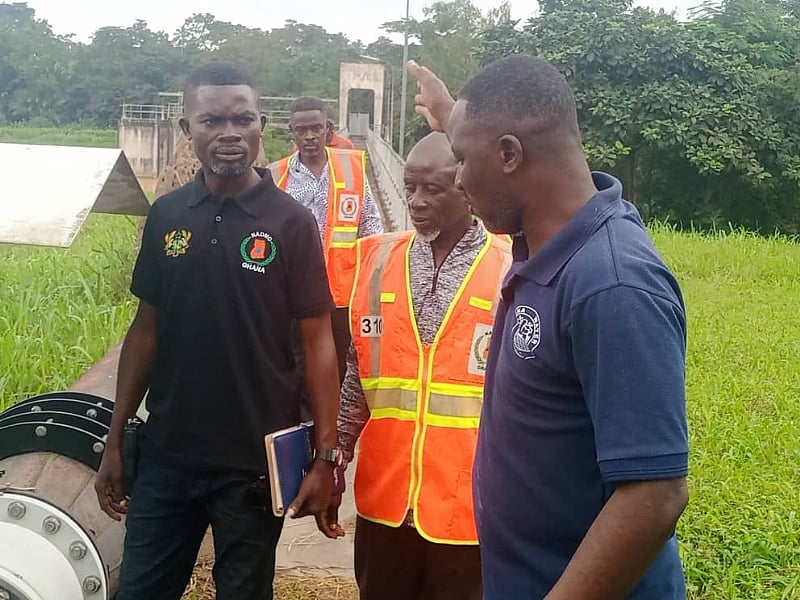The Central Region of Ghana is grappling with a severe water crisis impacting nearly thirteen districts, a predicament stemming from the shutdown of the Kwanyako waterworks two weeks prior. The crisis has brought hardship to residents, disrupting daily life and raising concerns about sanitation and health. The root cause of the problem lies in the heavy sedimentation and turbidity of the Kwanyako Dam, the primary water source for the treatment plant serving the affected districts. This contamination has rendered the raw water unsuitable for treatment, effectively halting the plant’s operations and cutting off the regular water supply to a significant population.
The pollution of the Kwanyako Dam can be traced directly to illegal mining activities, commonly known as “galamsey,” taking place upstream in the Eastern Region, specifically in the Anum Apapem and Adeiso areas. The unregulated mining operations release significant amounts of silt and other waste materials into the River Ayensu, which feeds the Kwanyako Dam. The influx of these pollutants not only contaminates the raw water but also damages the treatment plant’s machinery and equipment, exacerbating the crisis and hindering efforts to restore water supply. The consequences are far-reaching, affecting districts such as Agona East, Agona West, Gomoa East, Gomoa Central, Awutu Senya, Ajumako Enyan Essiam, Ekumfi, and Asikuma Odoben Brakwa.
The severity of the water shortage is most acutely felt in communities like Agona Kwanyako, Agona Asafo, Agona Swedru, and the surrounding towns. Essential facilities like the Kwanyako Senior High School and the Kwanyako Clinic are also struggling to cope with the lack of water, impacting both students and patients. The River Ayensu, traditionally a vital resource for these communities, has become unusable due to the pollution from galamsey. Despite the health risks associated with consuming contaminated water, many residents are forced to rely on the River Ayensu for their basic water needs, highlighting the desperation of the situation.
Responding to the growing crisis, Mr. Seth A. Williams, the Agona East District Director of the National Disaster Management Organisation (NADMO), has been actively assessing the situation on the ground, visiting affected communities and facilities to understand the extent of the problem. Recognizing the urgency of the situation, Mr. Williams has made a public appeal for intervention, calling on the government, NGOs, and other stakeholders to provide immediate relief. He has specifically requested the drilling of more boreholes to alleviate pressure on existing water sources and urged the Ministry of Water Resources and Sanitation to take swift action to dredge the Kwanyako Dam, repair the damaged equipment at the treatment plant, and most importantly, put an end to the illegal mining activities polluting the River Ayensu.
Acknowledging the dire circumstances, Hon. Queenstar Maame Pokuah Sawyerr, the Member of Parliament for Agona East, has initiated the construction of an emergency borehole at the Kwanyako Clinic. This immediate action aims to provide some relief to the clinic’s staff and patients, demonstrating a proactive approach to addressing the immediate needs of the community. The MP’s ongoing support for communities through the provision of mechanized boreholes over the years underscores the importance of sustainable water solutions in the region. This highlights the interconnectedness of development projects and emergency preparedness, particularly in areas vulnerable to environmental challenges and human-induced disasters.
Amidst the crisis, health concerns remain paramount. Mr. Williams has strongly advised residents against using water from the River Ayensu for any purpose, emphasizing the potential health risks associated with consuming contaminated water. His cautionary advice follows his engagement with communities like Mensakwaa, Osebo Nkwanta, and Kokoodo, which are currently heavily reliant on the polluted river. The ongoing monitoring efforts by NADMO and local authorities demonstrate a commitment to addressing the crisis. However, the underlying issue of illegal mining remains a significant challenge that requires a sustained and comprehensive approach to prevent future water crises in the region. The situation calls for collaborative efforts between government agencies, local communities, and stakeholders to address both the immediate needs and the long-term sustainability of water resources in the Central Region.














